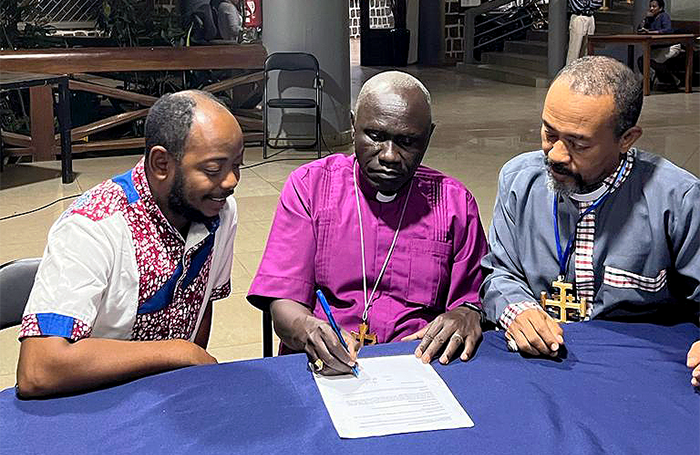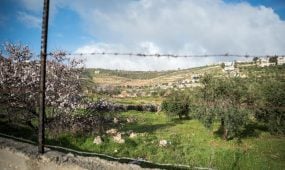Anglican Consultative Council signs Faith Leaders' Fossil Fuel Non-Proliferation Treaty
International
On World Environment Day, the Secretary General of the Anglican Communion, Bishop Anthony Poggo, joined a growing chorus of faith leaders, Indigenous peoples, civil society leaders, youth, cities, lawmakers, academics and scientists calling for a global treaty to phase out fossil fuels and support a just transition powered by clean energy and a sustainable future for all

On World Environment Day (5 June 2023), the Secretary General of the Anglican Communion, Bishop Anthony Poggo, has joined a growing chorus of faith leaders, indigenous peoples, civil society leaders, youth, cities, lawmakers, academics, and scientists calling for a global treaty to phase out fossil fuels and support a just transition powered by clean energy and a sustainable future for all.
Bishop Anthony has signed the Faith Leaders letter produced by the Campaign for a Fossil Fuel Non-Proliferation Treaty, an international network of more than 1,800 civil society organisations. He was requested to sign Treaty in resolution 5(b) at the 18th plenary meeting of the Anglican Consultative Council (ACC-18), when it met in Accra, Ghana, in February.
Bishop Anthony signed the letter this week in Madagascar, watched over by the Very Reverend Berthier Lainirina, Principal of Saint Patrick’s Theological College in Toliara and Provincial Secretary of the Church of the Province of the Indian Ocean, one of the province’s representatives on the ACC; and the Bishop of Toamasina, the Right Revd Jean Paul Solo, a member of the Anglican Communion Environment Network.
The campaign is proposing three pillars for the proposed Fossil Fuel Non-Proliferation Treaty:
- Non-Proliferation
Stop building out the problem by ending the expansion of coal, oil and gas production; - A fair phase-out
An equitable plan for the wind down of existing fossil fuel production, where nations with the capacity and historical responsibility for emissions transition fastest, providing support to others around the world; and - Just transition
Fast track the adoption of clean energy and economic diversification away from fossil fuels so that no worker, community or country is left behind
The treaty is the brainchild of the island states of Vanuatu and Tuvalu – whose very existence is under threat from rising sea levels in the Pacific. They are calling on other nation-states to join them and have the support of the World Health Organization, the European Parliament and thousands of others; including six nation states, 84 cities and subnational governments, 101 Nobel laureates, 2,150 civil society organisations, including the Anglican Consultative Council, 3,000 scientists and academics, and 623,l178 individuals.
Advertisement
In addition to asking the Secretary General to sign the treaty on behalf of the Anglican Consultative Council, the resolution approved by members at ACC-18 also encouraged Anglican primates and bishops to sign on behalf of the Churches and dioceses of the Communion and advocate their governments to halt new gas and oil exploration.
Campaigning for a transition away from fossil fuels is just one way in which Anglican Churches around the world are campaigning and acting to improve and protect the environment. At the Lambeth Conference of Anglican bishops, held last year in Canterbury, England, a global Anglican Communion Forest was launched – a global initiative comprising local activities of forest protection, tree growing and eco-system restoration undertaken by provinces, dioceses and individual churches across the Anglican Communion to safeguard creation.
The Bishop of Toamasina, Bishop Jean Paul Solo, told the Secretary General of a project in his diocese to plant trees to improve the environment and generate funds for the Church’s mission. 2,050 trees were planted last year, and last month, on Monday (29 May), as part of their Pentecost celebrations, a further 250 trees were planted. The diocese intends to increase the number of trees it plants each year.
The diocese are planting Cashew trees, and earn $50 for each kilo of Cashews. After two years, each tree is expected to produce five kilos annually.
Advertisement
The diocese is also working to educate local people about the need to protect the environment. “In Madagascar people use fire to burn all things,” Bishop Jean Paul said. “But now we try to teach them and explain that we need to protect the environment, our trees and our forests, not to burn it. We use it for our daily life. We use a tree for our house, but not to burn it. We use it for us.”
He explained that the message was getting through, with reductions in the amount of burning since 2019.
Bishop Anthony Poggo said: “I am delighted to sign the Faith Leaders’ Letter, as requested by ACC-18, and to do it in a province in the presence of a member of the Anglican Consultative Council. Throughout the world, inspired by stories of Anglicans living in the most vulnerable states, Anglicans are active in direct action to protect the environment and also in lobbying governments and inter-governmental bodies. In doing so, we are protecting the Earth that the Lord has made.”
- The wording of Resolution 5(b) of the ACC-18 states:
The Anglican Consultative Council:
- Notes that the ‘Fossil Fuel Non-Proliferation Treaty’ (to stop the increase of fossil fuel projects) offers a practical way to live out the fifth Mark of Mission in response to the climate crisis;
- Supports the Treaty and requests the Secretary General to sign the Treaty on behalf of ACC; and
- encourages primates and bishops to sign on behalf of the Churches and dioceses of the Communion and advocate their governments to halt new gas and oil exploration.
First published on the Anglican Communion News Service website on 5 June 2023.
Editor’s note: The ACSQ’s first Sustainability Roadmap was launched earlier this year. The Sustainability Roadmap lays out a framework for the different parts of our Diocesan community to formalise Sustainability Action Plans in a staged rollout.





